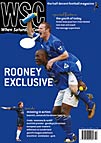 Jim McLean has finally quit. Ken Gall says the man who made Dundee United great was right about most things, even if he didn't always put it politely
Jim McLean has finally quit. Ken Gall says the man who made Dundee United great was right about most things, even if he didn't always put it politely
With all four Scottish entrants for European club competition experiencing varying degrees of disappointment and humiliation, and Arsène Wenger openly scoffing at the notion of ever signing a Scottish player, one might imagine that the game north of the border could do with all the help it can get.
How appropriate, then, that Jim McLean, one of the finest coaches of young players in Scottish football history and, perhaps, the last manager ever to take a Scottish club to a major European final, should choose to take his leave from the game now. Have the SFA called on the youth development expertise of the man who discovered, among dozens of others, Andy Gray, Richard Gough, Paul Sturrock and Duncan Ferguson? Was McLean asked to provide coaching assistance of any kind to wee Berti? Of course not – although anyone with even a cursory knowledge of McLean and his tempestuous career might understand why that was.
McLean’s sale of his 40 per cent shareholding in Dundee United brought to an end a 31-year spell at Tannadice as coach, manager, director, chairman and dictator (sometimes benevolent, sometimes less so). His achievements do not pale beside those of Jock Stein, Bill Shankly, Matt Busby and his friend and contemporary, Alex Ferguson. But his real peer was Brian Clough, another man of, shall we say, idiosyncratic personality who took previously unheralded clubs to the upper reaches of European competition.
It hardly needs adding that both Nottingham Forest and Dundee United have faded towards insignificance following their departure, with no subsequent manager capable of even approaching the glory days. (McLean even attempted a previously untried genetic experiment in management by appointing his own younger brother to the post, sadly without success.)
When McLean took over as United manager in 1971, the club had won no major honours. A dozen years later, United, as champions of Scotland, were a goal away from a European Cup final appearance against Liverpool in Rome. Three seasons on, they lost narrowly to Gothenburg in the UEFA Cup final, having beaten Barcelona home and away to get there. McLean took his team to a European final for an outlay of approximately £500,000 – something that the post-Souness Rangers have signally failed to do for, at the very least, 100 times that amount.
With a bad temper of world class proportions, McLean seemed to thrive on conflict and contrary behaviour. Many supposedly lifelong enemies were created within the club, the media and the football authorities, only for them to be welcomed back into the charmed circle at a later stage. Unsubstantiated tales of dressing-room punch-ups and shouting matches with agents, parents of young players and fans were common currency in Dundee for many years. The volcanic eruption of legend was finally seen in horrifying close-up in a celebrated post-match encounter with the BBC’s unfortunate John Barnes, who chose to ask the wrong question at the wrong moment to an under-pressure United chairman.
McLean’s sour-faced complaints were numerous and well rehearsed. “Agents are a cancer within the game.” “Players with not enough ability want too much money.” “Television is killing football.” “The Old Firm are stifling the Scottish game.” Lacking the acolytes in the press that automatically accompany a job at either Celtic or Rangers, McLean’s rants were often greeted with a smirk of indifference by the media and the authorities. The utterances of Rangers’ David Murray – a man whose talents as a coach were unproven at best – were, by contrast, treated with the utmost seriousness.
Yet, in retrospect, the prophecies of the Tannadice Cassandra were pretty close to the mark. Most of what he feared would happen to football – Scottish football in particular – has come to pass, and much of what he now suggests is ignored. As the balance of power shifted from clubs with authoritarian managers to whining brats and their vulgar agents, McLean’s policies with regard to young players were condemned publicly as neo-Victorian. According to agents – men who, it should be recalled, stood to gain substantially from the transfer of such young players – McLean was only just stopping short of putting nails in the young lads’ feet and sending them up the Tannadice chimney.
United’s policy was clear – long-term contracts for young players on low wages until they had developed, whereupon the club would accept a large transfer fee, which in turn would be channelled back into youth development. With the financial structure of the Scottish game close to meltdown at present, one can look at that policy for some considerable time before finding fault with it.
But the infamous television bust-up, serious heart surgery and – it must be said – the awareness that his 40 per cent of Dundee United would soon be worth 40 per cent of hee-haw, led to McLean finally calling it a day. And here is an indicator of how Scottish football treats its most notable eminences. McLean’s principal contribution to the game now is a weekly column in a tabloid paper entitled, with no apparent thought for the feelings of the aforementioned Mr Barnes, “The Column that Packs a Punch”.
From WSC 190 December 2002. What was happening this month